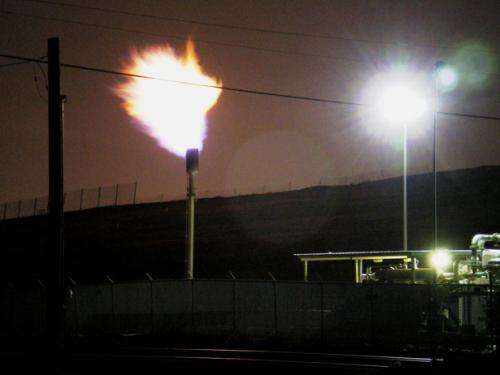Control methane now, greenhouse gas expert warns

(Phys.org) —As the shale gas boom continues, the atmosphere receives more methane, adding to Earth's greenhouse gas problem. A Cornell ecology professor fears that we may not be many years away from an environmental tipping point – and disaster.
"We have to control methane immediately, and natural gas is the largest methane pollution source in the United States," said Robert Howarth, the David R. Atkinson Professor of Ecology and Environmental Biology, who explains in an upcoming journal article that Earth may reach the point of no return if average global temperatures rise by 1.5 to 2 degrees Celsius in future decades. "If we hit a climate-system tipping point because of methane, our carbon dioxide problem is immaterial. We have to get a handle on methane, or increasingly risk global catastrophe."
Howarth's study, "A Bridge to Nowhere: Methane Emissions and the Greenhouse Gas Footprint of Natural Gas," will be published May 20 in the journal Energy Science and Engineering.
Natural gas – that once seemingly promising link between the era of oil and coal to the serenity of sustainable solar, wind and water power – is a major source of atmospheric methane, due to widespread leaks as well as purposeful venting of gas. Howarth points to "radiative forcing," a measure of trapped heat in Earth's atmosphere from man-made greenhouse gases. The current role of methane looms large, he says, contributing over 40 percent of current radiative forcing from all greenhouse gases, based on the latest science from the Intergovernmental Panel on Climate Change.
The role of methane as a driver of global warming is even more critical than this 40 percent value might indicate, Howarth notes. The climate system responds much more quickly to reducing methane than to carbon dioxide. If society aggressively controlled carbon dioxide emissions, but ignored methane emissions, the planet would warm to the dangerous 1.5 to 2.0 degree Celsius threshold within 15 to 35 years. By reducing methane emissions, society buys some critical decades of lower temperatures.
"Society needs to wean itself from the addiction to fossil fuels as quickly as possible," Howarth said. "But to replace some fossil fuels (coal, oil) with another (natural gas) will not suffice as an approach to take on global warming. Rather, we should embrace the technologies of the 21st century and convert our energy systems to ones that rely on wind, solar and water power."
In 2011, Anthony Ingraffea, Cornell's Dwight C. Baum Professor of Engineering; Renee Santoro, research technician in ecology and evolutionary biology; and Howarth published "Methane and the Greenhouse-Gas Footprint of Natural Gas from Shale Formations," in Climate Change Letters, where they explained that extracting natural gas from the Marcellus Shale will aggravate global warming more than mining and burning coal.
In this latest work, Howarth said that societies have run out of time and must pursue technological changes for sustainable energy now. "If we can control the methane, we have a chance to reverse course," he said.
Provided by Cornell University

















